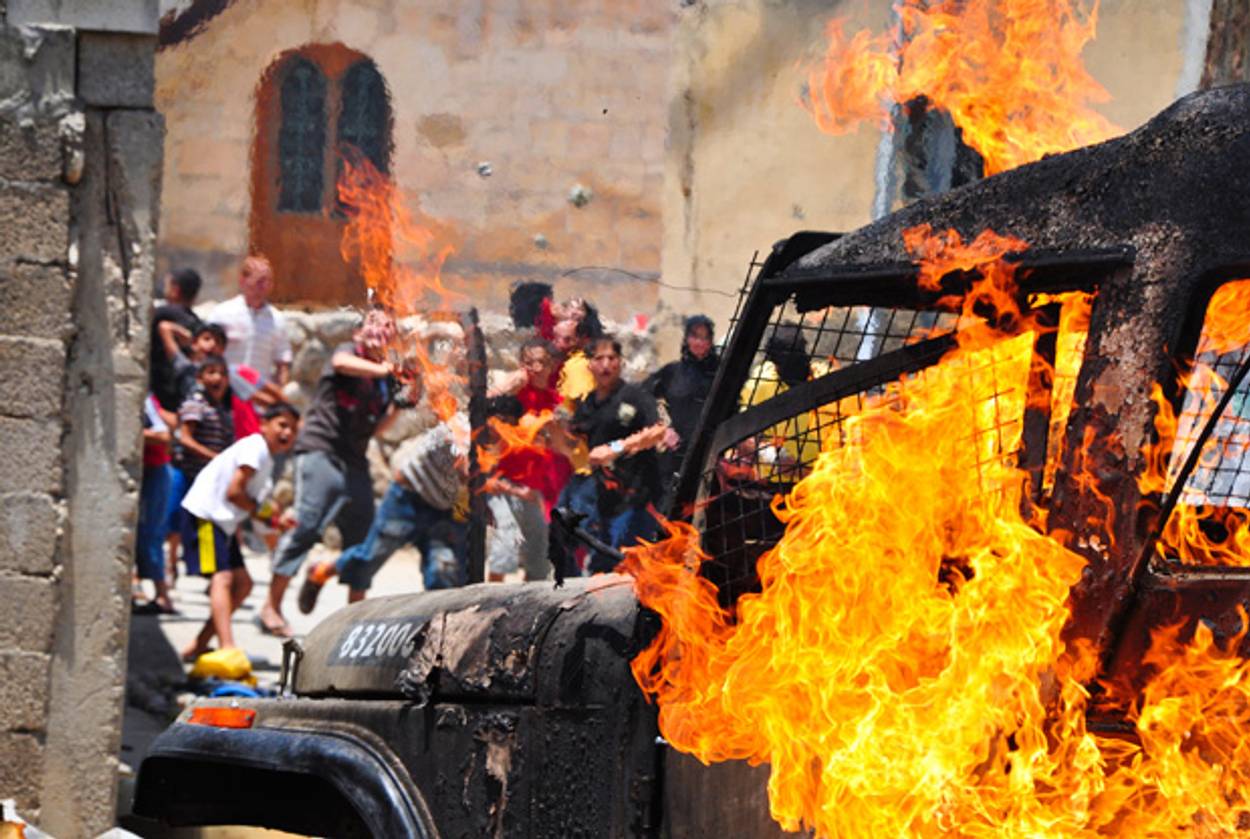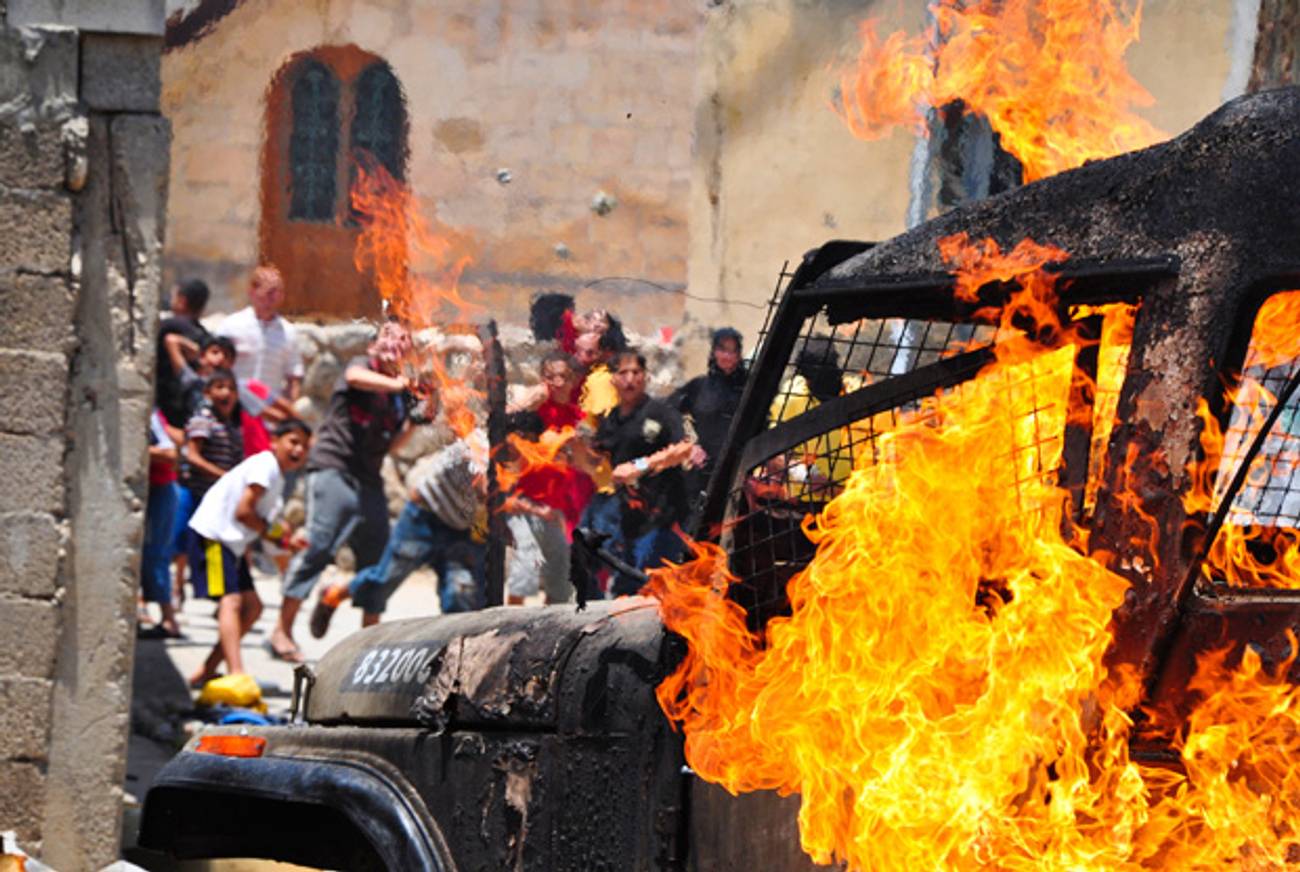Sharia Don’t Like It
An Israeli director is beaten in France, and his film, Rock the Casbah, gets mired in politics of perception




The façades of Paris’ seedy Place de Clichy would be familiar to French-film buffs. Francois Truffaut, having spent his childhood there, famously cast the square as the backdrop for his New Wave classic 400 Blows. Woody Allen’s Midnight in Paris pays self-conscious homage with a nostalgic black-and-white pan. So, it was perhaps fitting that last week the 13th annual Israeli film festival kicked off in the nearby plush Cinéma des Cinéastes art-house theater. But the Israeli who made the festival’s opening-night film, Rock the Casbah, arrived trailing a wake of controversy.
The week before, at the Aubagne International Film Festival, outside of Marseilles, Yariv Horowitz had been physically attacked on the streets. The details of the incident remain contested, as does the question of whether it constituted an anti-Semitic attack in a country reeling from a marked increase of such incidents. The attacker or attackers may or may not have been Arab, French, or French of Arab descent. And the festival, which awarded Horowitz a prize, later disputed many of Horowitz’s claims. All of which would be a tabloid case of he-said, she-said, if not for the fact that the film happens to portray Israelis and Palestinians in perpetual conflict.
The day after the Paris premiere, the director and I met for coffee. Horowitz is tall, slender, and boyishly handsome. He was posted to an IDF army photography unit in Gaza and Hebron in the early 1990s during the beginning of the First Intifada, where he witnessed many of the events depicted in his film. He is affable and opinionated—opposition to his movie, he said, had finally joined Hamas and the settlers in a heretofore unknown coalition—and tells stories with verve. (Once, when making a Ukrainian beer commercial showing teenagers drinking in the woods, he was taken to the fields of Babi Yar in Kiev to scout locations.)
Rock the Casbah is unmistakably an antiwar film, a brutal loss-of-innocence, horrors-of-war film set in the Gaza Strip in 1989. It is named for the Clash song that some Israeli grunts have been known to play loudly to overpower the call to prayer at a local mosque. The film opens with a stoical commander handing out rounds of both dummy and live ammunition and reminding the platoon of the rules of engagement before dispatching them to quell a rebellion in the middle of Gaza City. The platoon walks the winding streets of the city and chases after some rock-throwing youth. A naïve Russian conscript named Ilya has a washing machine dropped on his head from the roof of a building, killing him—inspired by an incident that Horowitz told me he’d heard about happening in real life. In the film, the recruits are left to stew on that same rooftop, slowly turning on each other out of boredom, frustration, and angst. They kick down doors and interrogate the civilian population. Street battles ensue with Palestinian youths pelting them with stones. The film’s denouement, a gruesome revenge killing, implicates everyone in a web of never-ending antagonism and tragedy. As the platoon pulls out of the mire in a jeep, they drive by a column of soldiers marching in to replace them.
It is tempting to knock the film’s reliance on the genre’s archetypical stock characterization, but Horowitz’s portrayal is vigorously honest and multifaceted. The portrayal of the Israeli soldiers runs the gamut from belligerent alpha male war machine to sensitive and maladjusted conscripts caught in a bad situation; the Palestinians range from rage-filled and unlovely teenage psychopaths to decent civilians caught in a bad situation. There have been conflict movies that have demonized either the Israelis or the Arabs, and others that have portrayed one side or the other as angelic; Rock the Casbah is compelling for managing to do all four at once—which might explain why it has been criticized harshly by both the right and left wing in Israel. (Its worldwide release is slated for September.)
The president of the Israeli Director’s guild, Horowitz is an earnest and intense Sabra and comes across as a sophisticated guy who somehow fell into a situation quite over his head. He is both amused and embarrassed by the international attention the incident has stirred up and, at the time I met him, still uncertain about the best course of action. “I tried to make an antiwar film and this is what happens,” he said. “Do you think I should press charges?”
As Horowitz relayed it to me, on the night in question, he and the film’s composer Assaf Amdursky were walking and having a cigarette when a group of drunken young men “coming from a party” approached them aggressively. “They started shouting ‘Fuck you!’ at us,” Horowitz told me. Much like several of the grunts in the film, the high-strung Israeli could not restrain himself and responded by saying, “Fuck you, too.” The incident escalated, he said, and he was punched in the back of the head and lost consciousness for an indeterminate amount of time. He was treated at the scene by first-responders and declined to go to the hospital. The next day, he showed up at the festival in time to receive his prize. Though Haaretz quoted Horowitz as saying, “It was clear that they were Arabs and that they were drunk,” in our conversation he denied ever saying that he was sure it was Arabs and that he had always insisted that he did not know who the youth were. Horowitz speaks some French and insists that his attackers had “a foreign accent.”
In the days following the incident, the anti-occupation blog Electronic Intifada has led the charge in attempting to portray Horowitz as a liar. Getting the facts of the story right has begun to mirror the Israeli-Palestinian conflict itself. The festival’s spokeswoman Gaëlle Rodeville issued a statement disputing Horowitz’s version. Rodeville claimed to have witnessed the incident and insisted it had nothing to do with anti-Semitism. “As far as we are concerned, he was not an Arab,” she stated. “The events that led up to a punch (a single punch) had nothing to do with a racist attack nor a lynching.” The French press has also been almost universally dismissive and the story underreported in comparison with its reception in the United States and Israel.
The irony of an antiwar Israeli being beaten by a Frenchman who may or may not be of Arabic descent is lost on nobody: The incident, hazy and as inchoate as its details remain, has been seized and appropriated by every side to suit its own needs, a microcosm for everything to do with the Israeli-Palestinian conflict and the occupation, and French discomfort with the topic of anti-Semitism. When I asked Horowitz if he had tried to make a political movie, his response was, “I was just trying to make a human movie.”
***
Like this article? Sign up for our Daily Digest to get Tablet Magazine’s new content in your inbox each morning.
Vladislav Davidzon, the Chief Editor of The Odessa Review, is a Russian-American writer, translator, and critic. He was born in Tashkent, Uzbekistan, and lives in Paris.
Vladislav Davidzon is Tablet’s European culture correspondent and a Ukrainian-American writer, translator, and critic. He is the Chief Editor of The Odessa Review and a Non-Resident Fellow at the Atlantic Council. He was born in Tashkent, Uzbekistan, and lives in Paris.